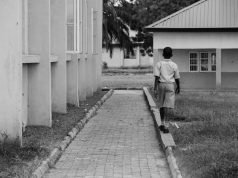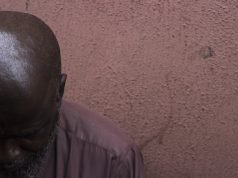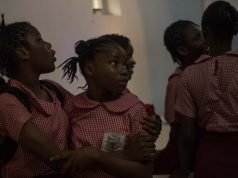It was not a weekend, not a time for a son to be around his fisherman father except that the teacher’s strike had extended beyond the Local Council’s “worst-case scenario,” twenty-eight days and counting.
The son stared into his father’s face, trying to decipher his expression. Though the nascence of his mind and his newness to the experience couldn’t plunge the dart right, he was certain this was not his father’s mien when his mother tended, on the spit, the bounty of his proceeds. He also knew his father liked to whistle when he returned from the weekend fish market, cradling his empty basket in his left and his son’s soft knuckle in his right, making it a point of duty to greet every person he encountered as he dangled the coins in his pocket.
The father pulled on his fishingline, half-hoping. But there was no tug, no pull of gravity. So he flicked it out roughly, splattering droplets from the brackish waters.
He cursed in their mother-tongue.
“What’s the matter?” his son inquired, his face a canvass of pure innocence.
The father acknowledged his son for a moment, wondering if he should lurch into the story of how the oil companies had ruined the river, murdered aqualife and his livelihood. But he thought the better and adjusted his torn fedora, “The fishes don’t want to be caught today.”
“Father, auntie said we should not use such words again”, scratching his nose and sniffing, he continued, “She beat my seatmate very well when he say it.”
The father, more concerned about his loss than his son’s words, forgot that his son’s seatmate was the child of the adulterous woman who sold local gin to the village men, mostly ex-fishermen who the oil spillage had occasioned their early retirement. It also did not strike him that the seatmate must have picked the vulgar words from the men who sauntered around his mother’s rump and prattled about their failed dreams, sometimes, and most of the time, about their conquered fantasies between throat-stinging snifters.
The father’s gaze rested on his empty basket. He knew the sun was coming down; that meant he had been fishing for more than six hours with no fish to show for it. His son basked in the sun, scrutinizing his father’s face, trying hard not to imagine what his mother would say to his father if he dare returned without fish or money.
As the sun trailed along the horizon, the man paddled his canoe towards the bank. He tied his canoe to mangrove tree and unceremoniously lifted his son out. They walked, their bare feet steeped in dried leaves making crunchy sounds.
The sounds reminded the boy of eating dried fish and reawakened his hunger. But as he looked up to his father’s face, he could imagine his father’s response if he told him about his hunger again.
“We are on our way home,” his father would say nonchalantly, but the son would still register the concealed snap.
They had strolled into the village’s heart with generous view of unclothed kids, half-clothed mothers, straw houses crowned with thatched roofs. The father’s palm fell on his son’s shoulder. He handed the boy his empty basket and said to him, “Be on your way home.”
Before the son would ask where his father was going, the man had left, his footsteps in the direction of his son’s seatmate’s mother’s rump.































